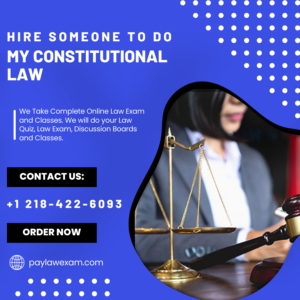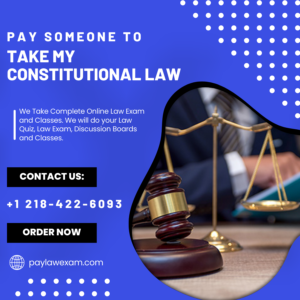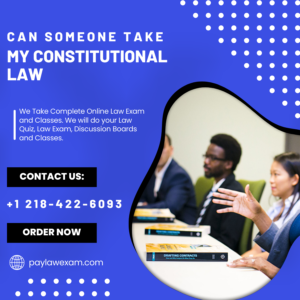Can Someone Do My Constitutional Law Exam
Hire Someone To Do My Constitutional Law
 Constitutional lawyers specialize in providing guidance and advice to public policy makers and government agencies about the legal limits imposed by federal and state statutes, usually employed by think tanks or public policy institutes.
Constitutional lawyers specialize in providing guidance and advice to public policy makers and government agencies about the legal limits imposed by federal and state statutes, usually employed by think tanks or public policy institutes.
Mastering how to identify the appropriate standard of review for any constitutional issue is vitally important, Do My Law Exam and students can create flow charts demonstrating these steps for analyzing each constitutional matter.
Exam Preparation
Constitutional law may not appear on every Multistate Essay Exam, but that doesn’t mean it should be disregarded when studying for it. Focus your study time on topics more likely to appear while keeping open your options for other possible options that might also make an appearance.
What We Do
We Take Your Law Exam
Order Now
Preparing for a constitutional law exam involves understanding its type, such as multiple choice, short answer or essay questions. Review any relevant course materials such as class notes, Evaluating State Laws tutor PowerPoint slides or articles related to your exam as well as making sure there’s adequate space and food/water available during your study session.
Add an extra dimension to your studying with Siegel’s Constitutional Law’s multiple-choice questions and essays for optimal learning. They are especially beneficial in honing hypothesis-setting skills – something which will come in handy once it comes time to write your actual essays answers!
Closed-Book Exams
Closed book exams force students to think critically and independently without using external sources for reference. It provides teachers with a great way to assess whether their students have fully grasped course concepts.
Comparatively, open-book exams tend to be more challenging as they require students to acquire knowledge more in-depth. Such exams typically ask more challenging questions that involve higher level thinking such as comparing, Impact On Commerce analyzing or evaluating material presented.
Therefore, open-book exams require students to prepare more efficiently by creating detailed and comprehensive study outlines. This helps reduce memorization while improving ability to analyze legal issues for higher grades on exams. Furthermore, students can write their answers using these outlines as references for faster writing, saving both time and effort when answering.
Individual Subject Reviews
Constitutional Law is one of the key subjects on the Multistate Bar Exam (MBE). It covers individual rights, the nature of judicial review and separation of powers in federal systems – topics which many jurisdictions place a heavy weight upon. Mastering it is integral to passing the bar exam successfully.
Individual subject reviews are essential in helping you to identify and address weaknesses in your performance. One common pitfall of constitutional law practice is not understanding when to apply the correct legal standard to each fact-based question, Regulate Economic Activities such as procedural due process or Equal Protection Clause analysis; by contrast, questions concerning First Amendment rights can often be assessed with less stringency.
Review sample answers for each of these categories of constitutional issues to ensure you know how to describe and apply relevant laws to specific fact patterns. Some students find flow charts listing each step easier.
Memorization
If you’re seeking a constitutional law tutor, be mindful that rote memorization alone won’t do. Instead, to be successful with learning concepts related to cases you are reviewing effectively and thoroughly.
Constitutional Law covers a broad spectrum of subjects that must be studied. To be successful in each one, Impact On State Laws you’ll need to learn which legal standards the Supreme Court applies when reviewing certain facts in an exam question and applying them correctly. Failing this could result in losing points during an examination.
When studying these subjects, it’s best to break up memorization into smaller chunks. For example, if you need to learn the scrutinies, choose one at a time and work on memorizing it until complete – this helps your brain retain more information than trying to memorize several subjects at once. Flash cards or mnemonic devices may be useful at these points as study aids.
Pay Someone To Take My Constitutional Law
 Constitutional law involves interpreting, implementing and amending federal laws. This involves understanding the roles played by constitutional courts, legislatures, Equal Protection Law executive branches of government as well as guarantee institutions such as electoral commissions or ombuds offices.
Constitutional law involves interpreting, implementing and amending federal laws. This involves understanding the roles played by constitutional courts, legislatures, Equal Protection Law executive branches of government as well as guarantee institutions such as electoral commissions or ombuds offices.
Free Speech: Time, place and manner restrictions may be permissible when they’re viewpoint neutral and tailored narrowly towards an important government interest. This course will explore standing, mootness, the Free Exercise Clause and the First Amendment as tools of expression.
Legal Research
Legal research involves gathering all applicable laws-court opinions, statutes, and regulations-that pertain to a case and then identifying which of them still apply in today’s environment. Attorneys use this material in court cases as supporting evidence to support their arguments; without this skill set they wouldn’t be able to solve legal problems effectively.
One of the key components of legal research is developing a research strategy. Doing this will save time and minimize frustration during the search for legal information. A good place to start when researching is secondary sources like law reviews, Significant In Constitutional Law legal encyclopedias and treatises to get an overview of your subject matter.
An essential aspect of legal research is ensuring the case or statute you’re using remains “good law”, meaning it has not been overruled by more recent cases or interpretation changes by more recent rulings. This is especially pertinent with statutes since their interpretation could have changed with newer cases interpreting them differently.
Writing Skills
Writing skills are an invaluable way of conveying ideas, information and messages in an understandable format to others. They require technical expertise with various writing styles, formats and conventions as well as knowing when different writing styles should be utilized based on context and the ability to adapt accordingly. Furthermore, writing can also help improve professional image by showing that you take pride in attention to detail and communications abilities.
Grammar proficiency is a vital component of writing skills, including those used for communication purposes. It entails being able to use correct syntax, Equal Protection Cases tense agreement and punctuation when writing communications as well as create logical sentence structures with less-common punctuation such as colons, semicolons or em dashes.
Constitutional Law exams are closed-book examinations, so any study aids that you bring into the classroom cannot be used during testing. You will instead rely on assigned readings, class discussions and material posted to the course website as sources for review.
Analytical Skills
An analytical skillset is an integral component of almost all careers, such as finance, data science, medicine, marketing and law. A strong analytical ability allows employees to recognize problems quickly and develop solutions to them that increase productivity while meeting challenges head-on.
Analytical skills encompass logical reasoning, critical thinking, research, communication and data analysis. If you want to enhance these elements of your resume, Regulate Economic Activities try including them as individual sections along with any relevant experience or education details.
To demonstrate your analytical capabilities during an interview, prepare to answer questions that require research on a topic. For instance, if asked to review information presented in a case study, focus on gathering detailed information and carefully considering all potential solutions for solving it. Pay close attention to details as even small errors can lead to inaccurate conclusions; remain open-minded toward new ideas and perspectives and allow yourself to think critically about different approaches taken towards solving issues.
Communication Skills
Constitution lawyers need to possess both written and verbal communication skills in order to present their cases effectively to juries or judges during trials, filing court paperwork on time, preparing arguments for each case, filing paperwork to file with courts and filing court paperwork on another.
Constitutional lawyers preparing for exams should review assigned readings and class discussions as well as course material posted on their course website. While study aids may be useful, they shouldn’t be used as replacements for course material as some may present the law differently, Equal Protection Clause thus leading students down the wrong path.
After earning their undergraduate degrees, aspiring constitutional lawyers typically enroll in law school to receive their Juris Doctor (JD). It’s recommended that these aspiring constitutional lawyers choose an accredited law school by the American Bar Association and gain experience through an internship before graduating and passing their state bar exam to become constitutional lawyers.
Can Someone Take My Constitutional Law
 Students of Constitutional Law study the laws, relationships and rights as outlined by the U.S. Constitution and often find employment with either private firms or government agencies.
Students of Constitutional Law study the laws, relationships and rights as outlined by the U.S. Constitution and often find employment with either private firms or government agencies.
Students aspiring to practice this field of law require strong verbal and Concept Of Executive Immunity written communication skills in order to practice this area effectively. Students must be able to clearly present cases before the court while also explaining them clearly to juries.
How is the Law Exam done?
Constitutional Law is an intricate field that encompasses legal principles that grant government agencies power while also setting boundaries on their actions. This subject examines federal-state relationships as well as citizen rights enshrined within the US Constitution, including federal judiciary structures and how different laws pertain to each of them.
As the starting point for constitutional law analysis, it is critical to identify which constitutional claim is being addressed. This step is critical as various tests may apply depending on its initial characterization (for instance equal protection and due process analysis may involve testing whether an issue involves fundamental rights; Laws In Constitutional when dealing with dormant commerce laws it involves whether they discriminate).
In order to do well on a constitutional law exam, it’s essential that you possess an in-depth knowledge of all levels of scrutiny. When discussing free speech issues, for example, you must outline general standing requirements such as injury infliction, causation and redressability as well as understanding various forms of preemption analysis such as express, implied and field preemption.
Can someone take my Multistate Essay Exam?
Furthermore, six 30-minute essay questions assess your knowledge of fundamental legal principles.
The MEE includes two Multistate Performance Test (MPT) tasks in the morning and six MEE questions in the afternoon, Protect Contractual Obligations with applicants given three hours for each MPT task to complete them in any order.
Preparing for the MEE requires writing multiple essays and focusing on its most frequently tested topics. But it is also essential to remember that Constitutional Law may appear on this exam; so do not neglect its consideration when planning your preparation strategy. Constitutional Law questions typically cover free speech, due process and equal protection issues as well as takings or Eleventh Amendment issues.
The Multistate Bar Examination (MBE), developed by NCBE, is a six-hour, 200 question multiple choice exam covering Constitutional Law, Contracts/Sales, Criminal Law & Procedure, Evidence, Federal Civil Procedure, Hostile Work Environment Real Property as well as Graded/Graded Scoring System for Portability (GPSS). User jurisdictions administer, grade and score this portable score examination.
The essay portion of the UBE contains questions requiring analysis of constitutional issues, such as standing, ripeness, mootness, free speech violations under equal protection/due process violations and the Establishment Clause. A well-prepared and strategic approach can greatly increase your MBE score; to gain practical experience in this field, consider applying for constitutional law internships during law school; however these opportunities are competitive but could help.